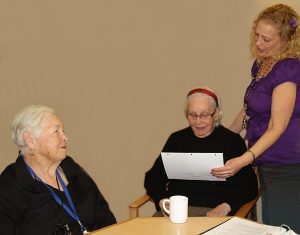He who has a ‘why’ for which to live, can bear with almost any ‘how’. (Friedrich Nietzsche)
We are all searching for meaning. Promoting purpose in life and meaningful relationships is key to well-being (1).
 A new study reveals key experiences that promote meaning and purpose in life from the residents’ perspective (2). These key experiences include: physical and mental wellbeing, belonging and recognition, personally treasured activities and spiritual closeness and connectedness.
A new study reveals key experiences that promote meaning and purpose in life from the residents’ perspective (2). These key experiences include: physical and mental wellbeing, belonging and recognition, personally treasured activities and spiritual closeness and connectedness.
The authors argued that residents’ everyday wellbeing should be a central focus of care and that attention should be given to the meaning-making power of experiencing belonging and recognition among others.
But how do we support residents who say “I don’t do groups.”, or “I’m not a joiner”? Or residents who don’t want to leave their rooms—ever, no matter how hard we try.
5 Helpful Tips
Here is an approach that I have had success with. Try engaging residents you are visiting in an altruistic project—something that is focused on helping others but can be done in their room during your visit. As human beings, we all find meaning in helping others. It’s called altruism and it’s in our DNA. Mother nature likes it when we help others and when we do, she makes us feel better. Adding a “helping others” component to a project helps develop a sense of purpose and meaning for that resident.
How is that possible? There are many creative approaches that help residents give back and contribute to their community. It is worth doing because it can result in increased connection between them and their peers and an ultimately an increase in well-being (those who give to others are healthier and happier!)
Here are 5 tips to try when visiting:
- Share a talent. Is there something the resident has done that they could share with the community? For example, do they paint, are
 they a poet, good at knitting? If so, could they share that in some way with the home? Perhaps invite them to display their painting at a special event and talk about it at the start of the event. This is a great way to build new relationships. Encourage other residents who admire their work to go visit them.
they a poet, good at knitting? If so, could they share that in some way with the home? Perhaps invite them to display their painting at a special event and talk about it at the start of the event. This is a great way to build new relationships. Encourage other residents who admire their work to go visit them. - Share a pride of family. Does the resident have a family member who has done something they are proud of, e.g. their daughter is a doctor, or simply a family photo they like that they could be shared at a resident gathering? Then follow up with a visit with a resident who connected with the photos is some way.
- Share a love of music. Is there a piece of music they love that could be played at a special event? Look at the calendar—is there an opportunity to do this? Then let others know that they chose the music before it is played. Then,…invite one of the listeners who shared the same appreciation for that piece of music to go and visit with them…you get the idea.
- Create a card for someone who needs support. Invite the resident to help make a get well card for someone who has just returned from the hospital, or a card for someone who needs encouragement, or is perhaps feeling lonely.
- Share advice. Find a bare wall that could use decoration. Invite the resident to help create a poster or a regular bulletin board with positive sayings. Each week bring in a sample of positive quotes for them to choose from. You can easily get these from the internet and print them out. Then enlarge them on the copier. Invite them to consider putting their name on the bulletin board, e.g. ‘Josie’s Sayings’. Point out the sayings frequently to other residents, so they know who chose the quote for the week.
Finding meaning means that life feels worthwhile. It gives us direction and a reason to get out of bed and leave the comfort and safety net of our living spaces. So, try out these ideas (and add your own of course!) next time your go visit someone who is socially isolated. You could help change a life.
Submitted by Kristine Theurer,
MA (Gerontology), PhD Candidate, University of British Columbia
References
(1) Irving, J., Davis, S., & Collier, A. (2017). Aging With purpose: Systematic search and review of literature pertaining to older adults and purpose. The International Journal of Aging and Human Development, 85(4), 403-437. doi:10.1177/0091415017702908
(2) Drageset, J., Haugan, G., & Tranvåg, O. (2017). Crucial aspects promoting meaning and purpose in life: perceptions of nursing home residents. BMC Geriatrics, 17, 254-263. doi:10.1186/s12877-017-0650-x

As we have developed a program for 1:1 interventional spiritual care in our 33 senior and health care communities, assessing the true expression of ones spirituality and how they are wired spiritually, has been extremely important especially when considering isolation or presumed isolation. Many residents have been introverts all of their life, it’s where they get their energy and strength each day. And many when overly encouraged to engage and they finally give in, lose their center, and that has brought on various “Spirit” conflicts. To answer this we have residents, their peers visit and engage them in their homes where they feel safest. Something to surely consider.
So I agree with the article and this approach to engaging residents. Thanks for presenting it.